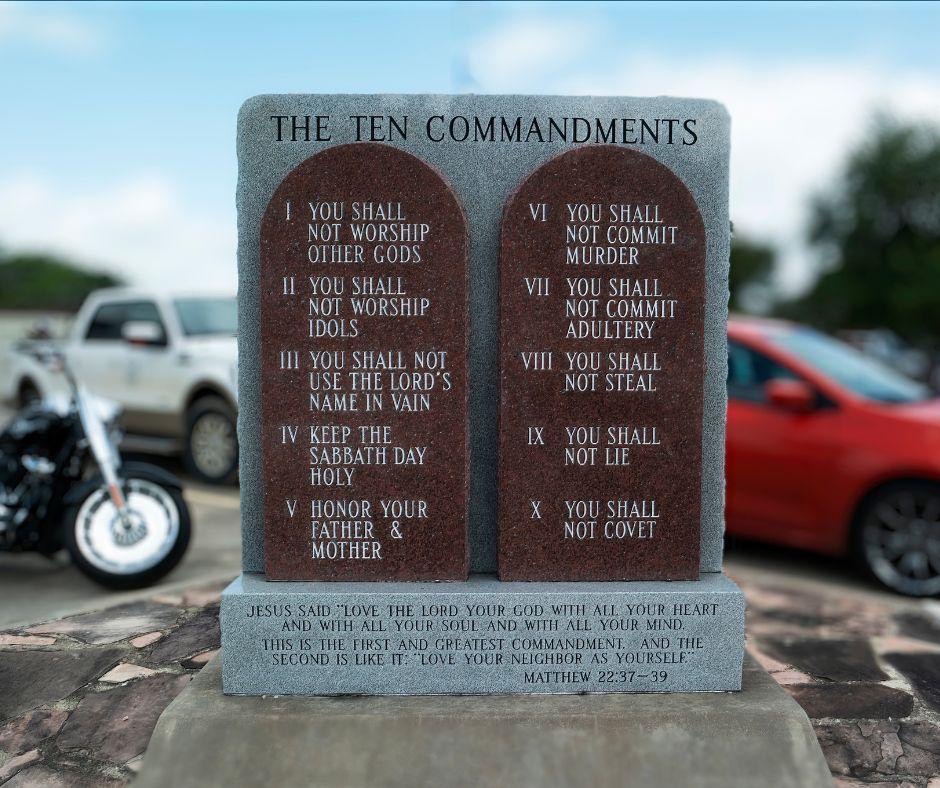The Ten Commandments, the set of biblical guidelines given to Israel by God through Moses, not only provide a basic code of conduct for moral living but have played a significant role in the development of American law and policy which even predates the Constitution. From the inception of America, courts, legislatures, and the Founders have referred to the Ten Commandments and their impact on culture and the legal system. In fact, the drafters of the First Amendment would never have dreamed they were abolishing the Decalogue unlike attempts in recent years by activist courts to do so. That is, until two historic U.S. Supreme Court victories now protect their presence on America’s landscape.
U.S. Congressman William Findley (1741-1821) observed that the Ten Commandments were “incorporated in the judicial law.” In fact, 12 of the 13 original colonies adopted the Decalogue into their civil and criminal laws. For example:
- The First Commandment states, “Thou shalt have no other gods before me.” In 1610, Virginia required its leaders to give “allegiance” to God, “from whom all power and authority is derived,” and who is the “King of kings, the Commander of commanders, and Lord of hosts.”
- The Second Commandment forbids the making of idols. The 1780 Constitution of Massachusetts stated in Part I, Article II, “It is the right as well as the duty of all men in society, publicly, and at stated seasons, to worship the Supreme Being, the great creator and preserver of the universe.”
- The Third Commandment prohibits taking God’s name in vain. This Commandment was adopted into law by Virginia in 1610 (“That no man blaspheme God’s holy name upon the pain of death”) and by Connecticut in 1639 (“If any person shall blaspheme the name of God the Father, Son, or Holy Ghost . . . he shall be put to death”).
- The Fourth Commandment states, “Remember the Sabbath day to keep it holy.” The Fourth Commandment was adopted by Virginia in 1610, New Haven in 1653, New Hampshire in 1680, Pennsylvania in 1682 and 1705, South Carolina in 1712, North Carolina in 1741 and Connecticut in 1751.
- The Fifth Commandment exhorts children to honor their parents. A 1642 Connecticut law cited to the Fifth Commandment for the proposition that children should honor their parents.
- The Sixth Commandment states, “Thou shalt not kill.” Courts have been very candid in tracing the prohibition against murder from colonial times to the present laws back to the Sixth Commandment.
- The Seventh Commandment states, “Thou shalt not commit adultery.” A 1641 Massachusetts law declared, “If any person committeth adultery with a married or espoused wife, the adulterer and the adulteress shall surely be put to death. Ex. 30.14.” Similar laws were enacted by Connecticut in 1642, Rhode Island in 1647, New Hampshire in 1680 and Pennsylvania in 1705.
- The Eighth Commandment states, “Thou shalt not steal.” Not only have the laws against theft been derived from this Commandment, but also laws protecting the integrity of elections.
- The Ninth Commandment prohibits perjury or bearing “false witness.” This Commandment became the foundation of America’s judicial system. Connecticut enacted a perjury law in 1642, Massachusetts in 1641, Rhode Island in 1647, and New Hampshire in 1680. The Oregon Supreme Court stated, “No official is above the law. ‘Thou shalt not bear false witness’ is a command of the Decalogue, and that forbidden act is denounced by the statute as a felony.”
- The Tenth Commandment prohibits coveting. This Commandment has been cited as the basis of civil laws against defamation, laws preventing election fraud, laws targeting white collar crime, and laws targeting modern forms of cattle rustling.
There are also many historic displays of the Ten Commandments embedded in the architecture in Washington, D.C. Near the top of the U.S. Supreme Court building is a row of famous lawgivers, and each one is facing Moses who is standing in the middle holding the Ten Commandments. Inside the High Court, the two huge oak doors have the Ten Commandments engraved on each lower part of the door and a display is also right above where the Justices sit. There is a prominent display at the Library of Congress as well as engraved in bronze on the floor of the National Archives. The Ten Commandments are also on the outside of the Ronald Reagan International Trade Building. Moses is engraved in stone over the Speaker of the U.S. House of Representatives and the Ten Commandments is in the seal of the Ninth Circuit Court of Appeals.
However, there have been many rulings by judicial activists in recent years striking down Ten Commandments displays on public property because of the “Lemon Test,” the legal test which came out of the ruling in Lemon v. Kurtzman that has been used to determine if a law violates the First Amendment Establishment Clause.
For example, in 2001, Roy Moore, then chief justice of the Alabama Supreme Court, installed a 5,280-pound granite monument depicting the Ten Commandments in the rotunda of the state’s judicial building. On October 30, 2001, three Alabama attorneys filed suit against Judge Moore alleging that the monument was a violation of the First Amendment’s Establishment Clause by endorsing religion. On November 18, 2002, U.S. District Judge Myron Thompson ruled that the monument violated the Establishment Clause, citing Lemon v. Kurtzman as precedent. Eventually, the Eleventh Circuit Court of Appeals agreed with the trial judge and that the monument should be removed. Judge Thompson ordered Judge Moore to remove the monument and he refused. On November 13, 2003, the Court of the Judiciary removed Judge Moore from office and the Ten Commandments monument was removed on November 14, 2003.
In McCreary County v. American Civil Liberties Union (2005), the American Civil Liberties Union of Kentucky sued two Kentucky counties for displaying framed copies of the Ten Commandments. The U.S. Supreme Court ruled 5-4 that the Ten Commandment displays in two county courthouses violated the Establishment Clause of the First Amendment. Writing for the majority, Justice David Souter focused on the history of the display and the lack of a secular purpose demonstrated by that history. The High Court invoked the “Lemon Test”, stating that the purpose analysis in that test is meant to ensure government neutrality regarding religion. Yet the same day, the High Court decided 5-4 in Van Orden v. Perry (2005) that a monument of the Ten Commandments in a Texas public park did not violate the Establishment Clause.
However, all those rulings to remove the Ten Commandments from America’s landscape are no longer valid because of two major victories at the U.S. Supreme Court last year.
On May 2, 2022, Liberty Counsel’s 9-0 victory at the U.S. Supreme Court in Shurtleff v. City of Boston involved censorship of Christian viewpoints regarding flag raisings. The High Court unanimously ruled that the city of Boston violated the Constitution by censoring a private flag in a public forum open to “all applicants” merely because the application referred to it as a “Christian flag.” The High Court unanimously rejected Boston’s use of the “Lemon Test” to censor Christian viewpoints.
In Kennedy v. Bremerton School District, Liberty Counsel argued in its amicus brief that since the Establishment Clause provides no justification for suppressing Coach Joe Kennedy’s private, religious speech to silently pray on the football field after games, the “Lemon Test” should be overruled. Then on June 27, 2022, the High Court ruled 6-3 in favor of the high school football coach and also finally buried the court-made “Lemon Test” citing Liberty Counsel’s 9-0 decision handed down in Shurtleff v. City of Boston involving the Christian flag.
The Kennedy ruling stated, “This Court long ago abandoned Lemon and its endorsement test offshoot… In place of Lemon and the endorsement test, this Court has instructed that the Establishment Clause must be interpreted by ‘reference to historical practices and understandings.’”
Liberty Counsel’s Founder and Chairman Mat Staver said, “As a result of the Shurtleff and Kennedy decisions, the Ten Commandments now can be freely displayed on government property as a reminder of the significant role these biblical guidelines play in the development of American law and policy as well as their impact on our culture and society. No activist court can ever remove them again.”
















